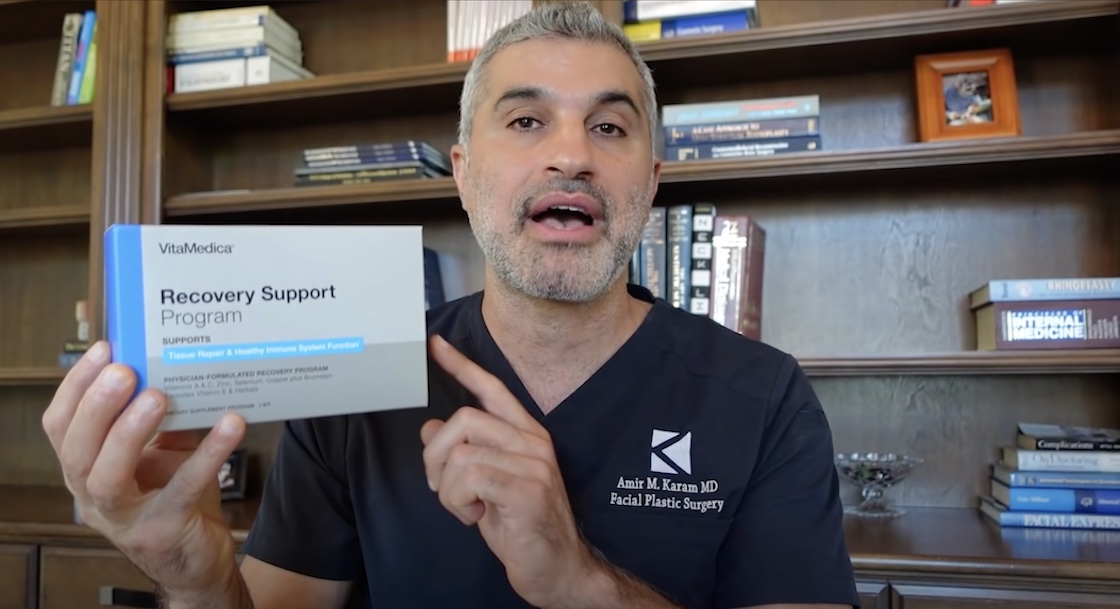From Southern California, a world-renowned facial rejuvenation specialist is sharing five ‘musts’ for patients preparing for facial plastic surgery.
These tips, the surgeon says, are, in fact, good and sound advice for any cosmetic surgical procedure a patient is going to have done.
And they apply whether the doctor, board-certified facial plastic surgeon Amir Karam, or any other surgeon will be operating.
Dr. Karam, a facial plastic surgeon of two decades and the creator of “Vertical Restore,” a novel approach to facial plastic surgery, encourages patients to listen to and carefully follow the advice of their own provider, but offers these five tips to patients of his own practice in Carmel Valley, California.
Table of Contents
1. Eliminate non-steroidal anti-inflammatory drugs, Ibuprofen, Advil, Aspirin, Ginger, Ginkgo Biloba, and Turmeric.
Karam says decreasing the amount of bleeding that occurs results in less bruising and swelling.
“There are some things you want to eliminate from your day-to-day two weeks before and two weeks after [surgery],” he says.
Specifically, “anything that will make you bleed will increase your risk of bruising and swelling after surgery.”
The Carmel Valley surgeon says he tells his patients that for two weeks before surgery and two weeks after surgery, “get off all of your normal vitamins and herbs, and we’re going to organize you on what we need you to do before surgery.”
“Alcohol, believe it or not, can make you bleed,” he continues. “So can smoking, which causes vasoconstriction, and tissue necrosis (tissue death).
“You actually need to stop smoking 6-8 weeks before facelift surgery,” he says, “And for at least a month or so after surgery.”
Nicotine patches and vaping aren’t replacement options, either.
“It’s nicotine, so if you think you’re going to stop smoking but you’re going to take nicotine gum or patches, vaping, all of it includes nicotine,” he says. “Even one or two cigarettes during that time can put you at much higher risk for skin flap necrosis.”
2. Certain vitamins may be advised pre- and postoperatively
At Carmel Valley Facial Plastic Surgery, Dr. Karam has patients begin a “Recovery Support Program” regimen from VitaMedica.
“This is just a supercharged high concentration of all the basic vitamins, including Bromaline, which is an anti-inflammatory.”
In addition to VitaMedica’s Recovery Support Program, Karam has his facial rejuvenation patients take Vitamin K for two weeks before surgery. The Vitamin K, he says, will potentially help improve a patient’s risk of bleeding after surgery, particularly if that patient is currently deficient.
Arnica montana, an anti-inflammatory, is also offered for a few days before surgery and a “week or so afterward.”
3. During recovery, elevate the area operated on
As for the postoperative phase, the doctor advises that patients sleep with the operated on area (the face) elevated above the heart.
“So you want to make sure that you’re sleeping elevated, [with] a couple pillows, a wedge, or if you have one of those beds…that actually elevate.”
You can use pillows or wedges available on Amazon, he says. The important end result being that, “you want to be slightly elevated, you want your heart to be below your head. That way, the blood flows downward, and that’s a really important thing to decrease swelling and fluid retention postoperatively.”
4. Carefully (and with a caveat), apply ice during recovery
The board-certified facial plastic surgeon says that icing in the first couple of days after surgery is very important.
But, there are some essential caveats.
- Don’t apply ice directly to the surgical flap (your skin surface), as it’s already compromised and doing so risks thermal burning and skin loss.
He recommends ice packs that start to heat when applied (indirectly) to the skin, using frozen peas, and putting a layer (or fabric) between the ice and skin surface, or cooling gel face masks.
5. Get rest, but don’t sleep or lie down all day
Karam advises patients to “really, really take it easy” after surgery, “meaning, just chill for at least two weeks after surgery.”
“Just chilling” entails:
- Don’t bend your head down
- Keep your neck and jawline elevated
- Don’t lift anything heavy off the ground
- Eliminating most physical activity during this period
Any type of pressure applied in the early days after facelift surgery can cause the blood vessels to burst, he says, leaving you with a hematoma, the most common complication after a facelift.
While cautioning against physical activity, the doctor also issued a warning: “I don’t want patients to be laying down all day long, or even laying in a bed all day long.”
Studies suggest that sitting upright is the best position to be in after surgery, the doctor says.
“Trust your surgeon, trust the process,” the doctor says. “Because it can be a little rough in the beginning.”
“But in the end, it’s going to be fantastic. You’re going to be glad you did it.”


